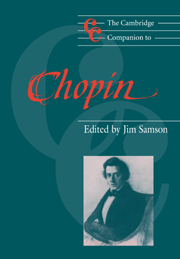Book contents
- Frontmatter
- Myth and reality: a biographical introduction
- PART 1 The growth of a style
- PART 2 Profiles of the music
- PART 3 Reception
- 9 Chopin in performance
- 10 Chopin reception in nineteenth-century Poland
- 11 Victorian attitudes to Chopin
- 12 Chopin's influence on the fin de siècle and beyond
- Appendix A historical survey of Chopin on disc
- Notes
- List of Chopin's work
- Bibliographical note
- Index
12 - Chopin's influence on the fin de siècle and beyond
from PART 3 - Reception
Published online by Cambridge University Press: 28 September 2011
- Frontmatter
- Myth and reality: a biographical introduction
- PART 1 The growth of a style
- PART 2 Profiles of the music
- PART 3 Reception
- 9 Chopin in performance
- 10 Chopin reception in nineteenth-century Poland
- 11 Victorian attitudes to Chopin
- 12 Chopin's influence on the fin de siècle and beyond
- Appendix A historical survey of Chopin on disc
- Notes
- List of Chopin's work
- Bibliographical note
- Index
Summary
While Chopin's influence permeates many countries and traditions, this chapter concentrates mostly on his adopted country of France. In addition to the direct effect of his own compositions, Chopin left an enormous influence there through his piano teaching. To take a few examples, Saint-Saëns, Bizet, Fauré, Debussy and Dukas were all immediate recipients of the ‘Chopin tradition’ through teachers or close musical contacts.
Fauré, Debussy and Ravel in particular are regarded as Chopin's natural musical heirs, being fundamentally pianistic composers and innovators. Support appears to come from the genres of nocturne, barcarolle, ballade, impromptu and prelude (and a single mazurka) taken over by Fauré, plus the piano Mazurka, Ballade and Nocturne of Debussy's early years, as well as his later Preludes and Etudes. On closer inspection, though, the title connections yield limited musical insights. Indeed, Fauré had little interest in those genre titles, which were often pressed on him by publishers. Debussy's early Chopinesque titles often conceal different sources, his later Lisztian use of picturesque titles is quite different from Chopin's practice, and with Ravel such titular connections are almost non-existent. From that point of view it could well be argued that all these composers grew farther from Chopin as they matured. Yet their music tends to tell the opposite story, as we shall see, with the most potent links lying under the surface of their mature music, and in less obvious contexts.
- Type
- Chapter
- Information
- The Cambridge Companion to Chopin , pp. 246 - 283Publisher: Cambridge University PressPrint publication year: 1992
- 2
- Cited by



